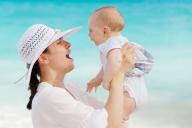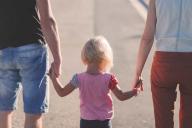child development
How to teach a child to cook: useful rules for parents
Cooking is a useful skill for children. In this article, we will tell you how to teach your child to cook on their own.
Diana Dashkevich children parenting parenting tips mental health Psychology 30 March 2024How to reveal a child's talent: instructions for parents
Psychologists believe that every person has his own talents. In this article, we will tell you how to reveal your child’s talent.
Diana Dashkevich child behavior children parenting parenting tips Psychology 28 March 2024What tricks will help you raise a child with adequate self-esteem: expert opinion
The success of a human life, in addition to objective circumstances, is also influenced by the level of self-esteem. In this article, we will tell you how to raise a child with normal self-esteem.
Diana Dashkevich parenting parenting tips children self-esteem Psychology 23 March 2024How to turn reading into pleasure for a child: experts gave practical recommendations
Reading is not only a pleasant, but also a useful activity. In this article, we will tell you how you can instill a love of reading in your child.
Diana Dashkevich children mental health intelligence Psychology 21 March 2024Signs of a Toxic Mother: Check Yourself and Your Parents
A toxic mother negatively affects a child's development. In this article, we will talk about the signs of toxicity in motherhood.
Diana Dashkevich mother parenting children safety mental health Psychology 26 February 2024How to raise a happy child: Useful tips
You should always start with yourself: develop your horizons, work through traumas with a psychologist. In this article, we will tell you about the secrets in raising a happy child.
Diana Dashkevich children mother mental health Psychology 15 February 2024A new study: A caring adult – positive impact on childhood
A recent study reveals that positive relationships with parents and caregivers during childhood can reduce the risk of depression, anxiety, and stress in adulthood. The research underscores the lasting impact of early emotional support on long-term mental well-being.
Kate Yakimchuk research family caring adults kids Psychology 29 January 2024A new discovery: Successful education – engagement matters
Education experts suggest that boosting student outcomes involves focusing on high engagement in the learning process. A recent experiment revealed that less than a third of teachers are currently involving students in complex learning activities that foster critical thinking and problem-solving.
Kate Yakimchuk research education intelligence cognitive skills Psychology 29 January 2024Expert Explains: How Stress Affects Child Development
The following signs indicate the presence of psychological stress in a child: Emotional instability - easy crying, irritability, touchiness, anxiety, uncertainty in actions, inconsistency in actions, moodiness, fears.
Diana Dashkevich children children safety mental health Psychology 28 January 2024Important to Know: Normal Development of a 3-Year-Old Child
Hardware and laboratory tests are used to determine the primary lesions that caused speech delay, their location and the extent of the lesions.
Diana Dashkevich children mental health health facts Psychology 28 January 2024A new discovery: Learning new skills – how exercising helps kids
New research suggests that both before and after practicing new skills, individuals like violinists, surgeons, and gamers can benefit from physical exercise. This also applies to anyone looking to enhance their fine motor skills.
Kate Yakimchuk research kindergarten exercising cognitive skills Psychology 26 January 2024A new discovery: A big leap – why it's so hard for kids to adapt to kindergartens
Starting kindergarten is a big deal for kids, and a new study tells us that how well they adapt during the first few months is super important for their success. Researchers discovered that kids who made a smooth transition in the first 10-14 weeks of kindergarten scored higher on tests for both school subjects and social skills at the end of the year.
Kate Yakimchuk research kindergarten child behavior intelligence Psychology 26 January 2024Expert Explains: What is Childhood Trauma
Psychological trauma is a dangerous, shocking event that disrupts emotional balance and threatens life. A child injury would be one that occurred before the age of 18. It is important to distinguish psychological trauma from stress.
Diana Dashkevich childhood mental health health facts Psychology 25 January 2024A new discovery: Physical activity in kids – it's more beneficial than you might think
Engaging in physical fitness activities since childhood is linked to changes in the brain's grey matter volume during adolescence, says a recent study. The experiment reveals that young adults who demonstrated better neuromuscular fitness – being stronger, faster, and more agile – had larger grey matter volume in a specific cerebellar region known as Crus I.
Kate Yakimchuk research health facts exercising cognition Psychology 25 January 2024A new discovery: Screen time matters – limit your kids' online presence
Everyone knows that kids shouldn't spend too much time using their devices, but not everyone understands how they actually affect children. A review of 23 years of neuroimaging research, analyzing 33 studies with over 30,000 participants under the age of 12, has found that time spent on screen-based media has measurable and long-term effects on children's brain function.
Kate Yakimchuk research screen time education brain cognition Psychology 24 January 2024A new discovery: Phonemes instead of graphemes – teach kids to read faster
Research reveals that additional practice in blending printed letter sounds significantly aids struggling beginner readers in reception classes. While it might sound strange, it can actually be beneficial for lots of kids.
Kate Yakimchuk research reading cognitive skills education Psychology 24 January 2024A new study: Plants are important – teach your kids about them
To effectively educate children about climate change and sustainability, experts emphasize the need for a greater focus on the importance of plants in school curriculums. The study suggests that botany should play a more prominent role in educational policies to address the insufficient representation of plant significance and threats in science education.
Kate Yakimchuk research ecology education child behavior Psychology 23 January 2024A new discovery: Children are the future – how good growing conditions affect them
Providing good education and social services to young children can help communities thrive. Research professors at Virginia Tech shared insights from their decades-long study on early childhood education and development.
Kate Yakimchuk research cognitive skills learning intelligence Psychology 23 January 2024A new discovery: Autistic kids – how do they develop social attention?
As kids grow, they usually pay more attention to social things like faces or interactions. However, kids with autism often find non-social things more interesting, like textures or shapes.
Kate Yakimchuk research autism attention cognitive skills Psychology 22 January 2024A new study: Stressed kids – how it leads to health issues
A new study found that kids who went through a lot of stress from their teen years to adulthood were more likely to have various health problems like high blood pressure and obesity. The experiment looked at health issues called cardiometabolic risk factors.
Kate Yakimchuk research children safety abuse stress Psychology 20 January 2024


















